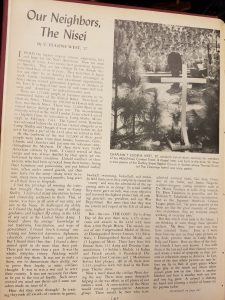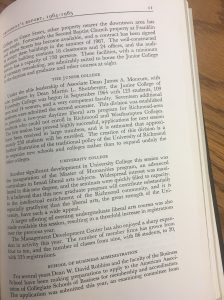by Joshua Kim
(A Nisei is a person of Japanese descent born in the U.S. with immigrant parents. Nisei directly translates to “second generation” in Japanese.)
“At the outbreak of the war, 112,000 of these good people were taken from their homes, businesses, farms, schools, and churches and put into ten relocation camps throughout the midwest. Of these there were 70,000 American citizens by birth.” T. Eugene West, University of Richmond Class of 1927.
In his piece for the Richmond Alumni Bulletin, alum T. Eugene West passionately spoke on behalf of the Japanese American community and the horrors they faced during WWII, specifically the repercussions of Executive Order 9066.


